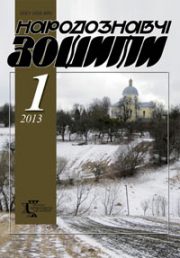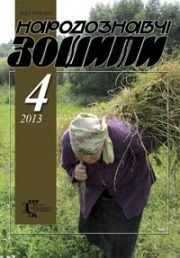The Ethnology Notebooks. 2017, 4 (136), 948–953
UDK 792
DOI https://doi.org/10.15407/nz2017.04.948
CREATIVE AND ORGANIZATIONAL POLICY OF THE INTERNATIONAL THEATRE FESTIVAL «MELPOMENA TAVRII»
Yudov Mykhailo, associate professor
at the KNUKiM,
Ye. Konovaltsia Street 36, 01601, Kyiv, Ukraine.
Contacts: knukim@ukr.net
Vichna Anastasiia Victorivna — master’s degree of dramatic art,
an actress Kyiv Municipal theatre “Kyiv”,
street of Myropil’s’ka, 1, 02192, Kyiv, Ukraine
Contacts: e-mail: kmatl@i.ua
Abstract. The article investigates creative and organizational aspects of one of the oldest festivals in Ukraine — the International Theatre Festival «Melpomena Tavrii». The concept of the festival is briefly analyzed as organizational and artistic form, which is a series of public demonstrational shows of skill levels (achievements) under the through artistic idea or concept, localized in the limited calendar period in particular geographic and cultural space; also festival’s social and cultural function is considered. The statistics of participants’ geography, jury`s work organization, results of choosing the winners are exposed to analytical study. Main attention is focused on the analysis of the nominating policy of «Melpomena Tavrii».
Keywords: festival-competition, the International Theatre Festival «Melpomena Tavrii», nominating policy.
Received 15.06.2017
REFERENCES
Blyzniuk, M. M. (2010). Teatral’ni festyvali iak forma kul’turnoho spivrobitnytstva. Kul’tura i mystetstvo u suchasnomu sviti: naukovi zapysky KNUKiM. Vyp. 11. Kyiv: Tsentr KNUKiM. S. 35–41 [in Ukrainian].
Velymchanytsia, O. (2010). Koly u Kherson prykhodyt’ «Mel’pomena». O. Velymchanytsia& A. Pohribna // Kino-Teatr. 2010. № 5. S. 42–45 [in Ukrainian].
Domans’ka, O. A. (2005). Estetychni aspekty mizhnarodnoho teatral’noho festyvaliu-laboratorii «Mystets’ke berezillia». Mystetstvoznavchi zapysky: zbirnyk naukovykh prats’. Vyp. 8. Kyiv: Milenium. S. 140–149 [in Ukrainian].
Domans’ka, O. A. (2005). Protses rozvytku teatral’no-festyval’noho rukhu v suchasnomu khudozhn’o-mystets’komu zhytti Ukrainy. Aktual’ni problemy istorii, teorii ta praktyky khudozhn’oi kul’tury: zbirnyk naukovykh prats’. M-vo kul’tury i mystetstv Ukrainy; Derzhavna akademiia kerivnytstvom kadriv kul’tury i mystetstv; Kyivs’kyj nats. un-t im. T. Shevchenka. Vyp. 15. Kyiv: Milenium. S. 202–208 [in Ukrainian].
Domans’ka, O. A. (2005). Protses rozvytku teatral’no-festyval’noho rukhu v suchasnomu khudozhn’o-mystets’komu zhytti Ukrainy. Aktual’ni problemy istorii, teorii ta praktyky khudozhn’oi kul’tury: zbirnyk naukovykh prats’. Vyp. XV. Kyiv: Milenium. S. 202–208 [in Ukrainian].
Domans’ka, O. A. (2004). Teatral’ni festyvali v konteksti mystets’koho zhyttia suchasnoi Ukrainy. Pytannia kul’turolohii: zbirnyk naukovykh prats’. Vyp. 20. Kyiv: Tsentr KNUKiM. S. 308–314 [in Ukrainian].
Domans’ka, O. A. (2005). Festyval’ iak samostijnyj ta samodostatnij sub’iekt teatral’noho protsesu. Materialy Vseukrains’koi naukovopraktychnoi konferentsii «Dukhovna kul’tura iak dominanta ukrains’koho zhyttietvorennia»: 2223 hrudnia 2005 r. Kyiv. Ch. 2. S. 64–66 [in Ukrainian].
Lytovka, O. (2013). Festyval’nyj rukh Ukrainy periodu ii nezalezhnosti. Sotsial’ni komunikatsii: zbirnyk naukovykh prats’. Vyp. 2. Kyiv: Tsentr KNUKiM. S. 111–115 [in Ukrainian].
Lytovka, O. (2013). Festyval’nyj rukh Ukrainy periodu ii nezalezhnosti. Sotsial’ni komunikatsii: zbirnyk naukovykh prats’. Vyp. 2. Kyiv: Tsentr KNUKiM. S. 111–115 [in Ukrainian].
Khroma, H. I. (2002). Festyval’: slovo, terminy, mystets’ke iavysche. Visnyk Derzhavna akademiia kerivnytstvom kadriv kul’tury i mystetstv: naukovyj zhurnal. Kyiv. № 3. S. 97–103 [in Ukrainian].
Shevchenko, L. (2008). Mel’pomena u vyri zhanriv i styliv: «Mel’pomena Tavrii» 10 rokiv. Kul’tura i zhyttia. 4142. 7 zhovtnia. S. 4 [in Ukrainian].
Shevchenko, L. (2006). Sviato iednosti. Kino-Teatr. № 5. S. 41–43 [in Ukrainian].
Mizhnarodnyj teatral’nyj festyval’ «Mel’pomena Tavrii». Retrieved from: melpomena.ks.ua [in Ukrainian].







